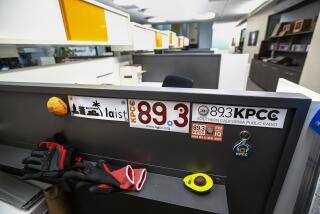NO ON-AIR PLEADING : PBS STATIONS TRY âPLEDGE-FREEâ DRIVES
Public television stations in Miami, Boston and San Francisco have experimented with âpledge-free months,â and now the nationâs flagship public television station, WNET in New York, is giving it a try.
But KCET Channel 28 in Los Angeles isnât about to climb on the bandwagon.
Most PBS stations have been reluctant to bury the on-air fund-raising drives, which some critics call âbegathons.â Pledge months--August, December and March--are the stationsâ lifeblood, raising a large chunk of the operating budget.
At WNET, the money raised through on-air badgering of viewers amounts to 25% to 33% of its total budget, and 50% of its discretionary funds. Even better, the pledge money comes with no strings attached, unlike contributions made by corporations for specific programs.
âItâs just, âHereâs the money, folks, because we love you,â â Roz Kay of WNET explained.
But the way the stations raise the cash--day after day of hard-sell, on-air begging, pleading and whimpering that interrupts programs--offends viewers.
âIt is irritating. It makes people nuts,â said Ellen Frey of WGBH in Boston, the first station to experiment with eliminating begathons.
âPeople hate them,â said Betty Martin of WPBT in Miami, which has begun its second pledge-free year.
âWe get many letters,â said Stella Giammasi of WNET. âItâs kind of a dilemma. Some research shows that if we werenât irritating, people wouldnât respond. They call us with their pledge in the hope that we will shut up.â
At WPBT in Miami, pledge-free months have been an overwhelming success.
âBy giving our south Florida viewers this reprieve (from the on-air onslaught) we brought in 11,000 new members and we raised $3,433,676 last fiscal year,â said Martin. That figure is an 18% increase over money raised the previous year.
WNET hopes to experience a little of Miamiâs magic this August, using a mild form of viewer blackmail. In mailings to about one million people, WNET will put it plain and simple: give enough money now, $750,000, and weâll get rid of the summer begathon.
It means that WNET must receive $84,000 a day for nine days in order for the pledge period to be canceled. Viewers will be kept informed of the totals. If viewers donât heed the call, the on-air pleading will be back.
âWe canât take a chance on losing $750,000,â said WNETâs Kay.
At KCET, however, there are no plans to abandon the Aug. 16-24 pledge drive or any others, said Donald Youpa, senior vice president for marketing and development.
âThe problem with the âno-pledgeâ events is that you go back to your traditional gift-giving group and ask them for another gift. You donât build in new business,â Youpa said. âItâs a great public relations vehicle--people say, âWhat a relief!â--but there are times youâve got to do things for good business reasons. The key to pledge is to get new business, not old business, and the only way you get new business is to press.â
He said that KCET recently conducted a survey among its viewers--subscribers and non-subscribers alike--and found a generally high acceptance of the pledge campaigns. People didnât necessarily like them but they understood that that was one of the ways Channel 28 had to go about its business, Youpa said.
Bostonâs WGBH has gone back to on-air pledge drives, mainly because the campaign did not attract enough new members.
More to Read
Sign up for Essential California
The most important California stories and recommendations in your inbox every morning.
You may occasionally receive promotional content from the Los Angeles Times.








